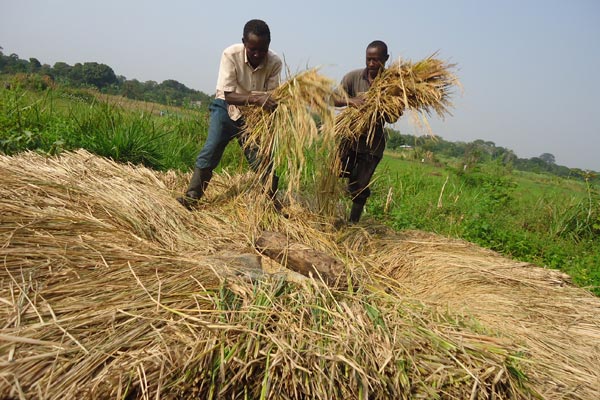 In the country of Uganda there is presently a long dry season and several crops are failing:
In the country of Uganda there is presently a long dry season and several crops are failing:
Farmers harvest rice in Kayunga District.
By Peter Wamboga-Mugirya
Uganda is experiencing a widespread prolonged dry-spell since April-May, whose hardest impact to agriculture is failure of the first-season crops, mainly maize and beans.
This translates into poor food harvests and negatively effects local and export trade, among others.
Climate and agricultural experts report the drought has affected Karamoja, Teso and lower Mt. Elgon (Bugisu and Sebei) in the east, a large part of Busoga, much of central region and parts of western region.
Low yields
Farmers in these diverse regions say they have incurred losses via costs on labour opening up land or ploughing it, purchase of seeds and other inputs, after rains expected to start March-April up to May-June, did not come in sufficient amounts.
If the rains came, they were scattered and thin on the ground.
This led to poor germination especially of cereals (rice, millet, sorghum) and hence low growth rates, that have translated into low yields, including maize and beans—two key crops that constitute most diets in Uganda.
Maize and beans are also a big part of farm produce that traders buy and sell for domestic and export trade. Market vendors and millers also heavily rely on beans and maize, respectively, while poultry and livestock’ feeds have maize as a key ingredient.
Farmers from Teso, Busoga, Central and Bunyoro say they are counting losses at a time when the first season’s harvest is due.
Dominic Etellu, a farmer from Serere, says hunger is now widespread in Teso, especially Katakwi, Amuria and parts of Serere to the extent of some residents steal food from kitchens and gardens.
“Thieves are carrying atapa (millet and cassava bread) from the fire as owners wait for it to get ready. They are also stealing cassava from gardens,” he says adding that a similar scenario played out in 1992, when Teso suffered extensive drought.
“This drought has affected us badly. Greatest loss is to maize, millet, sorghum, beans and peas. We need drought-tolerant varieties and irrigation.”
Worst hit
Alfred Namasa, a district councillor in Mbale, says maize, millet, beans and pastures begun drying from late March and early April for those who cultivated far from wetlands, that enable minimum irrigation. “Much of Mbale and mainly low-lying areas like Busiu Sub-county are worst-hit,” says Namasa also a farmer.
Severely affected
Johnson Kato Tibatya, from Bugabula in Kamuli District, revealed that most smallholder and large-scale farmers have incurred massive losses. It is not only in Kamuli but in Jinja, Luuka, Buyende, Kaliro and Kayunga districts.
He has 13 acres of mangoes from which he usually harvests up to 20 tonnes a season, while for oranges, he has three and a half acres whose yields this season, have been severely affected.
“The oranges have wilted. They had fruited well, but due to poor rains, the fruits are little in size and less juicy. They’ll therefore fetch less money,” says Tibatya, who is also vice chairman, Kamuli Citrus Farmers’ Cooperative Society.
In central Uganda, the cattle corridor—Rakai, Sembabule, Masaka, Kalungu, Mubende, Kiboga, Kyankwazi, Nakasongola, Mpigi, Butambala, Gomba, Kayunga, etc—which suffers seasonal dry spells is the hardest-hit by the current drought.
Calisti Sserwadda, a farmer-trainer at Luweero-Kasaana Catholic Diocese, says Luweero, Nakasongola and Nakaseke districts are also counting serious losses.
Most of the maize and beans have been extensively damaged, including banana plantations.
In the sub-counties of Butuntumula, Luweero, Makulubita and Katikamu, farmers have lost their investments in maize.
“Farmers like me who did dry planting are better than those who waited for rains. First, the rains came late and too little, hence the widespread losses,” says Sserwadda, an official of the Caritas-founded Community Integrated Sustainable Association—which operates in Luweero, Nakaseke and Nakasongola.
Ronald Magado, the Coordinator Nakasongola District Farmers’ Association (NADFA), confirmed Sserwadda’s report. He says all the 11 sub-counties of the district have been affected by drought.
“The first season has been very grim indeed; almost 50 per cent of the farmers have recorded a loss,” he said.
The March rains abruptly stopped in mid-April, seriously impeding production and then the rains resumed in mid-June affecting second season planting.
In southern Uganda, things are not looking any better. Coffee farmers are lamenting too.
Michael Ssali, a coffee farmer in Lwengo District says the little rains have dealt a serious blow.
Produce prices
“There’s a poor harvest of beans and when it comes to coffee, yields are very poor this season. I normally harvest 100 gunny bags that fill a truck.
This season, I forecast 30-40 bags only. Owing to shortages, the price of kasse (unprocessed) coffee is now at Shs5,200 from as low as a Shs3,000,” Ssali told Seeds of Gold.
From Bunyoro, a prominent farmer, Mr Wamala in Kibaale-Kagadi revealed that large hectares of stunted and wilted maize are being slashed away, burnt or fed to livestock.
“Forest encroachers have contributed to poor weather and micro-climate performance. Forest reserves of Kangombe, Kanaga, Muzizi and Rizaire have been degraded greatly affecting their ability to positively influence our micro-climate,” says Wamala, the chairman Kibaale Civil Society Network (KICSON).
“My own losses, he added, are 50-50 percent as I lost 25-acres of maize, out of 50 acres I planted.”
Unprecedented
The neighbouring Kakumiro, Kyenjojo, Hoima, Kyegegwa, Ntoroko and Mubende districts are affected the same way as Kibaale-Kagadi.
An official from the Water and Environment ministry, Paul Isabirye confirmed that Uganda has experienced poor first season rains.
This caused the poor agricultural performance being experienced, adding that while part of the dry season has been the normal annual occurrence, there are some particular cases of unprecedented early or late onset/absence of the rains.
“This scenario was caused by different low and high pressures in the southern hemisphere pulling away rain-bearing winds or pushing them much further beyond Uganda,” he explained.
A case in point, in late 2015, southern Africa experienced El Nino and later Lanina was in the oceans.
Rains diverted
Partly this year, the phenomenon pulled rains southwards from the region, then later high pressures pushed rain-bearing winds to the north.
Then some rain-bearing Monsoon winds from the Indian Ocean blowing towards East Africa, were diverted by high pressures and they shifted elsewhere.
“These activities partly contributed to the destabilisation of the seasons as experienced,” explains Isabirye, a climate change expert.
He relates the spell to already-predicted climate change impacts. Much of western and south-western regions are experiencing a dry spell too.
National concern
State minister for Agriculture, Christopher Kibanzanga confirmed that he has received similar reports.
“Indeed I’ve heard and personally experienced this phenomenon, which has wrecked havoc to the important first-season crop, across much of Uganda. In Rwenzori sub-region where I come from, farmers have mainly lost large acres of maize,” says Kibanzanga.
He adds he would like to get a comprehensive nationwide report from technocrats in his ministry to form a basis for policy-makers’ discussions on appropriate steps to take.
“It’s a matter of national concern,” he said.
To note
Climate and agricultural experts report the drought has affected Karamoja, Teso and lower Mt. Elgon (Bugisu and Sebei) in the east, a large part of Busoga, much of central region and parts of western region.
However, the mid-northern, near north and entire stretch of the Acholi and Lango sub-regions, there are less drought impacts, as the region had relatively better rains than the eastern, central and western regions.
editorial@ug.nationmedia.com




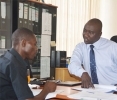




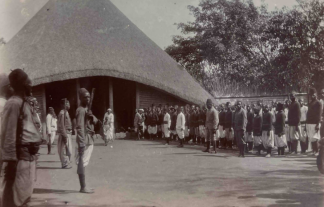










 In the country of Uganda there is presently a long dry season and several crops are failing:
In the country of Uganda there is presently a long dry season and several crops are failing: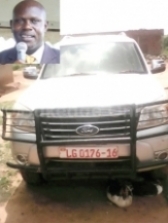



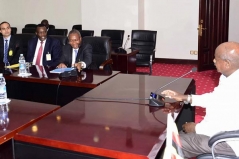

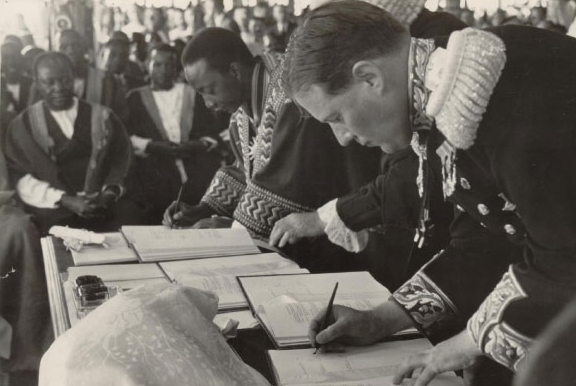




Well then the process of daylight robbery of tax payers money certainly must have rules of procedure as well.
One should remember that the Staff of the Bank of Uganda did oppose the Parliamentary investigation to take place.